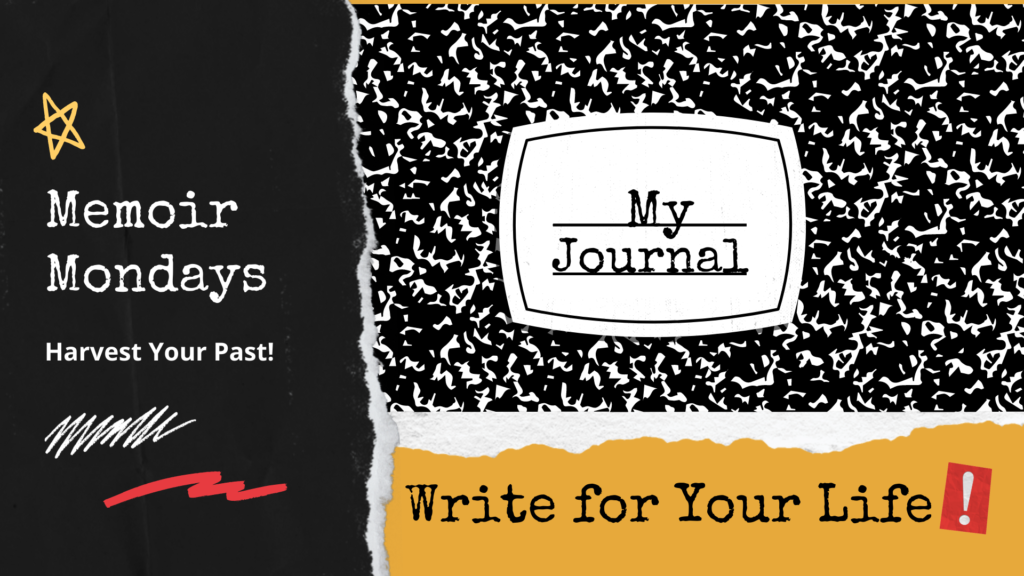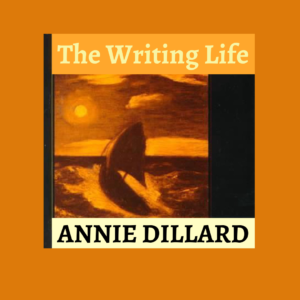
Most adults know this, and most college kids do, too: Organizing and Keeping-Up-With is the secret of success in most worlds. It is especially important for writers. Writers must not only keep up with appointments, but they must also keep up with ideas, too. And after we’ve finished writing a piece, we need to keep track of where and when we submitted it for publication–and if we sell a piece, we find ourselves tracking its sales.

Memoir Mondays is a day committed to journaling, and hopefully, it will encourage people to start the habit of Writing Daily. Memoir Mondays is a day that we’ll simply write. But it is part of my larger effort to encourage people to create a multi-purpose journal in which they will both write and keep up with new ideas and everything else that is going on in their lives.
How to Participate in Memoir Mondays:
All of you need to get a cheap, black-speckled journal at Walmart, Dollar General, or wherever else. If you already have a journal, that’s okay, too. But toward the end of the year, I’ll share tips for decorating and altering a simple composition book to turn it into an illustrated journal.
But for several weeks, we will focus on writing, and our writings will spill out of the memories that we still have from our childhoods. There are several reasons that we should write stories from our childhoods, but primarily, we should do that because our childhood stories are the ones that we know best. Annie Dillard said that well:
“It should surprise no one that the life of the writer–such as it is–is colorless to the point of sensory deprivation. Many writers do little else but sit in small rooms recalling the real world. This explains why so many books describe the author’s childhood. A writer’s childhood may well have been the occasion of his only firsthand experience.”
― Annie Dillard, The Writing Life [On Writing Memoir]
Your first journal writing assignment will have to do with HOME – But don’t worry. We’ll start out small.
Most of you know that my primary writing interest lies within the field of writing for children. One of my favorite Middle-Grade Novels is Tuck Everlasting, and in that book, Natalie Babbitt provides some good descriptions of the Tucks’ home.
In Tuck Everlasting, Babbitt uses the Theme of Home to wrap the lives of the Tucks in a warm glow. Inga Moore does the same thing in her picture book A House in the Woods
The Tucks’ home was also in the woods, and “the woods” suggest that these two books are also using another theme for writers: the Woods–or Nature.
Through a series of guided writing assignments, we’ll explore our own memories of both nature and our homes, but our memoir journey will be slow. All of us have tons of other things to do, but I am firmly convinced that journaling about our own lives is one of the most important things that a writer can do.
Home is a Driving Force for Every Art Form
In many cases, the artists, especially writers and songwriters, describe and/or idealize one specific home from their memory, but most often, the home that artists seek is something internal–an idyllic place that most people never truly reach.
“I am homesick for a place I am not sure even exists–One where my heart is full, my body loved, and my soul understood.” – Anonymous
Have you ever awakened with a vague aching that seems to come from within yourself–from deep inside your heart? I have, and I believe it is the pain that some might say could be attributed to a hole in one’s heart. On those occasions, I am not sure what is missing, and I am not sure why I ache. The feeling seems like a kind of fear, but I cannot identify a specific thing that frightens me. In one sense, several things might be out of place in my life, but I have had this feeling periodically across several time periods of my lifetime. In fact, this feeling has revisited me often since my childhood. Many other writers have the same haunting feeling, and that is why the theme of darkness versus light plays prominently in a great deal of literature.
Something about A Home is also often an important part of stories, songs, and books. Invariably, writers feel that if they can simply find that “home,” the vague feeling of homesickness will go away.
As I have said many times before, I believe that some song lyrics are literature. Here is a song about Home that Wynona Judd wrote:
https://www.youtube.com/watch?v=B2H59ld07Dw (Links to an external site.)
Flies On The Butter (You Can’t Go Home Again)
Wynona Judd
Old tin roof, leaves in the gutter
A hole in the screen door big as your fist
And flies on the butter
Mama baking sugar cookies, we were watching cartoons
I heard her holler from the kitchen
“Which one of you youngen’s wants to lick the spoon?”
Yellow jackets on the watermelon, honeysuckle in the air
Daddy turning on the sprinkler
Us kids running through it in our underwear
Old dog napping on the front porch, his ear just a twitching
Fell asleep on granddaddy’s lap
To the sound of his pocket watch ticking
Oh, oh, it doesn’t seem like it was all that long ago
Oh, oh, you can dream about it every now and then
But you can’t go home again
Me and my best friend Jenny set up a backyard camp
Stole one of mama’s mason jars
Poked holes in the lid and made a firefly lamp
Me and Billy Monroe, sneaking down by the river
I’m still haunted by the taste of the kiss
I was too scared to give him
Oh, oh, it doesn’t seem like it was all that long ago
Oh, oh, you can dream about it every now and then
But you can’t go home again
There’s a blacktop road, a faded yellow centerline
It can take you back to the place
But it can’t take you back in time
Oh, oh, it doesn’t seem like it was all that long ago
Oh, oh, you can dream about it every now and then
But you can’t go home again
Old tin roof, leaves in the gutter
A hole in the screen door big as your fist
And flies on the butter
Wynona’s song lyrics are a poetic type of memoir writing.
The Judds Biography
https://www.youtube.com/watch?v=VN8CUPJpMIw (Links to an external site.)
A memoir is an autobiography. It is something that a person writes about himself or herself, and it is based on his or her own memories.
Some of you already have memories that you should write about.
Wynona’s song lyrics in “Flies on the Butter” aren’t even full sentences. That’s ok. A lot of poetry is not written in full sentences. Wynona has just tossed out a series of sentence fragments–a series of phrases–and juxtaposed them together, but we, the reader or the listener can put those phrases together and understand what Wynona is talking about. We can understand the story that Wynona is telling us.
“Old tin roof, leaves in the gutter
A hole in the screen door big as your fist
And flies on the butter”
With her words, Wynona has painted the picture of an old country house that has no air conditioner. To keep from burning up inside, the people have left the doors and windows open, but the screen on the door has a hole. Therefore, the flies have gotten into the house.
Wynona must be singing about a late summer or an early autumn memory. The leaves have begun to fall, and the fallen leaves have landed in the gutter. Here are some more words that paint pictures of things that most of us have seen in our own lives:
“Yellowjackets on the watermelon, honeysuckle in the air….
“Old dog napping on the front porch, his ear just a twitching….
“Stole one of mama’s mason jars
Poked holes in the lid and made a firefly lamp….
“Oh, oh, it doesn’t seem like it was all that long ago
Oh, oh, you can dream about it every now and then
But you can’t go home again
There’s a blacktop road, a faded yellow centerline
It can take you back to the place
But it can’t take you back in time.” Judd, “Flies on the Butter”
You can do just about anything that you want to do in your journal. Your journal is YOUR journal I want you to write some full paragraphs in your journal. I” check for those from time to time. But I also want you to feel free to jot down a word or two words that come to you, from time to time, words that are meaningful in some way to you.
Journal Assignment 1 for Monday, September 19: Start a page in your journal, and place the following words at the top of that page:
Thoughts of Home
Below that title, start adding words or phrases that remind you of your home.
You should have written at least 5 entries by Monday.
This is how I might begin my Home page for Monday, September 19;
Thoughts of Home:
Cotton Patches
Cotton Lint Flying in the Air
The Ben Franklin Dime Store
The Corner Grocery Store
The Book Mobile
Camp
Campfires
Swimming in the Lake
The Weeping Willow in My Backyard
******************************************************************************
Although I have lived in some large metropolitan areas, I grew up in a rural, country area, and I never want to forget my rural heritage. It is who I am. What are the things that define you?
Be honest! Right now, I want to caution you to NOT write a bunch of rosy stuff that you wish had been you. Be honest. Dig deep inside and pull out some words that capture what is unique to you and your home.
Your journal will be as secret as you want it to be. If you gild the lily in your memoir, you are lying to yourself.
This doesn’t mean that your journal should be a whining pity party. Do that somewhere else–or don’t do it at all. Your journal is just your attempt to nail it–like it truly was. But keep in mind, that memoirs are not tell-alls. Again, you might want to tell all the grisly details of your life somewhere else, but a memoir is mere snippets of a person’s life. In most cases, the snippets aren’t even arranged chronologically.

What A Memoir Is Not
- Memoirs are not the places that writers go to hash and rehash all of the brutal and unfortunate experiences of their lives. I have tried that kind of writing, and it is like wading in quicksand. The more you stir your pity pot, the quicker you are sucked into your own deep black hole.For years before I actually followed through with it, I thought about writing my memoir. I am a natural storyteller–it is simply part of my genetic code. I was born into a family of storytellers. I have also been through a wide assortment of experiences that have collectively provided me with the fodder for some good tales. Yet, before a few years ago, each of my attempts to write a memoir has been doomed because I believed that Memoirs were Confessions–Confessions that were stretched across the confines of a timetable. In reality, the best Memoir writing is not confessional and it is not mere personal history.
- Memoirs are also not simple histories that begin with what a writer has been told about his birth and are followed by the most cogent points after that–all listed, according to a timeline. That defines an autobiography. Often, autobiographies are sterile. They are little more than facts that are stitched together with a few paragraphs, here and there. Quite honestly, I hardly ever read biographies or autobiographies, but I read tons of memoirs. Memoirs are engaging, and again, they are not volumes of whining.
What A Memoir Is
- In reality, the best memoirs are not chronological at all. They are simply groups of stories that are told in a searching and reflective way.
- Quite often, memoirs skip all around the writer’s history.
- In one chapter, stories from several times during a person’s life may be pulled together around one theme.–like Home. An entire memoir may examine several themes.
- Memoirs may ask more questions than they provide lists of facts.
- Through a person’s memoir, we are allowed to listen to the writer as he thinks and as he processes and tries to make sense of some of the events of his life.
- Memoirs are also invitations into the writer’s heart. While an autobiography might be a cold and precise treatise–much like a textbook or a history book–good memoirs tend to be written more creatively–using figures of speech, poetic devices, etc. The facts are not made up, and liberties are not taken when repeating them. They are simply laced together with fine and textured thread.
Skills Needed for Writing Memoir
- The memoir writer needs to be able to recall actual things that have happened to him during the course of his lifetime.
- The memoir writer needs to learn to write sensitively and reflectively.
- The memoir writer needs to start journaling about his memories, and he needs to start several lists of snippets that remind him of his past.
Discover more from Jacki Kellum
Subscribe to get the latest posts sent to your email.

